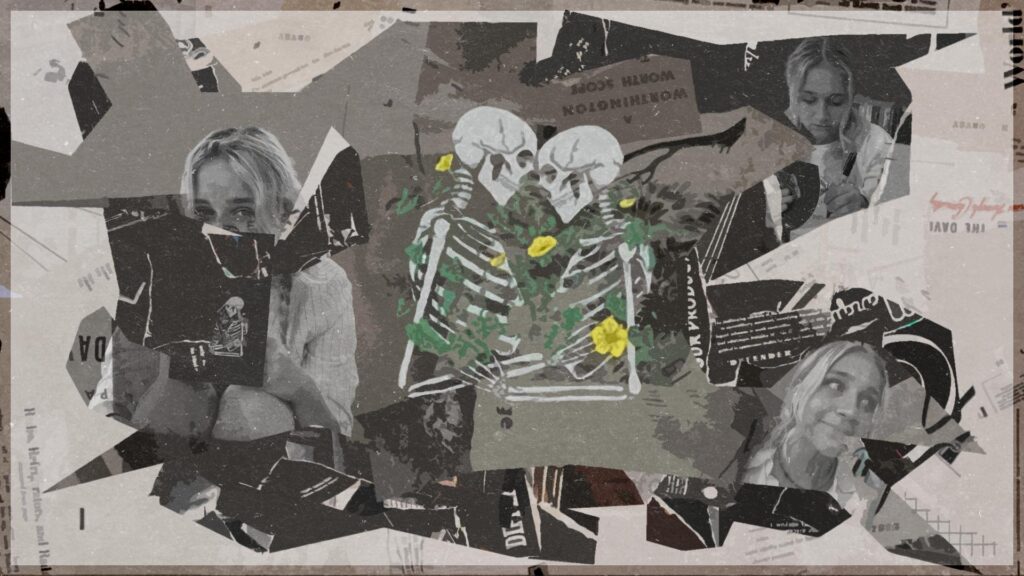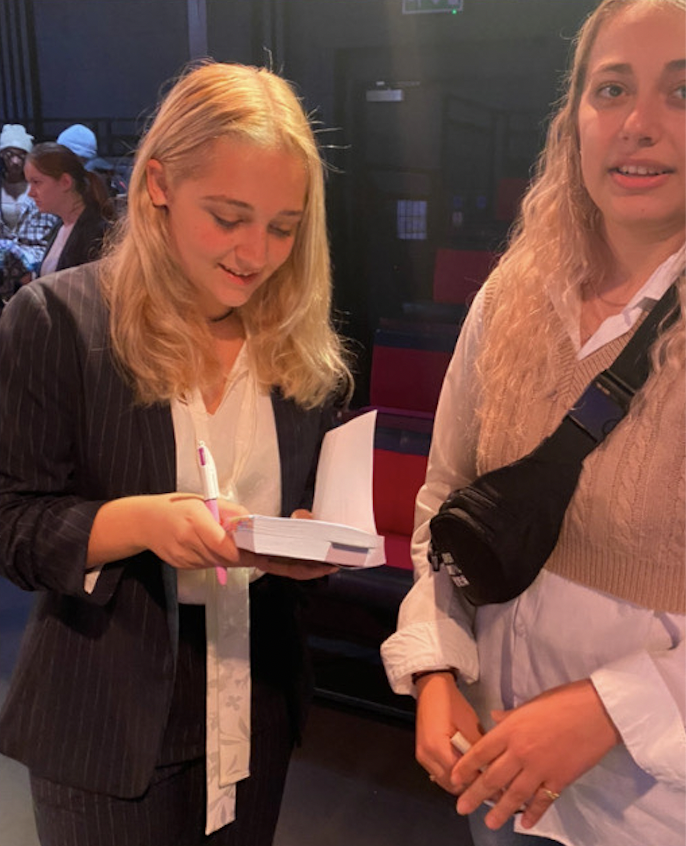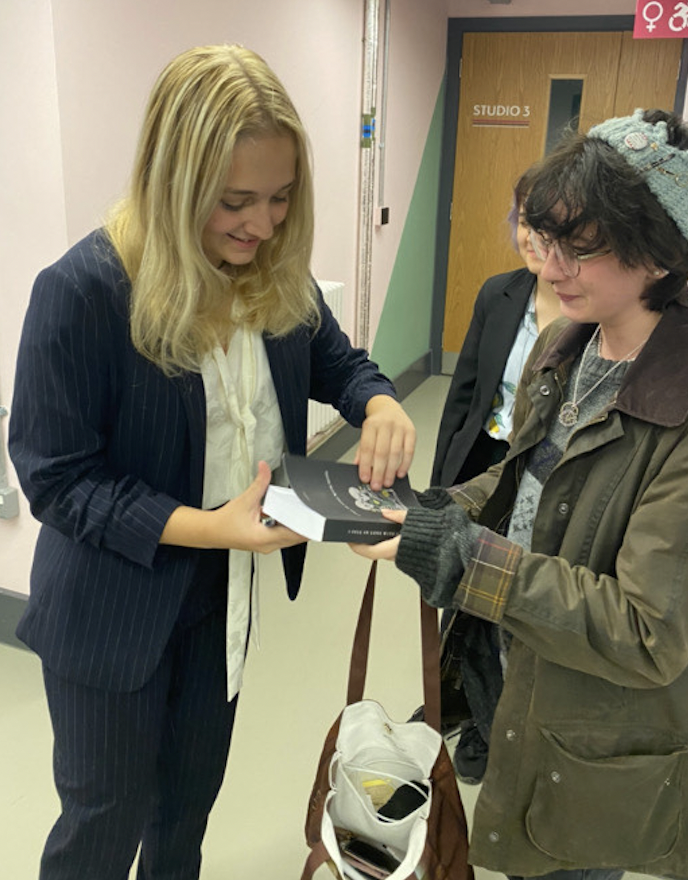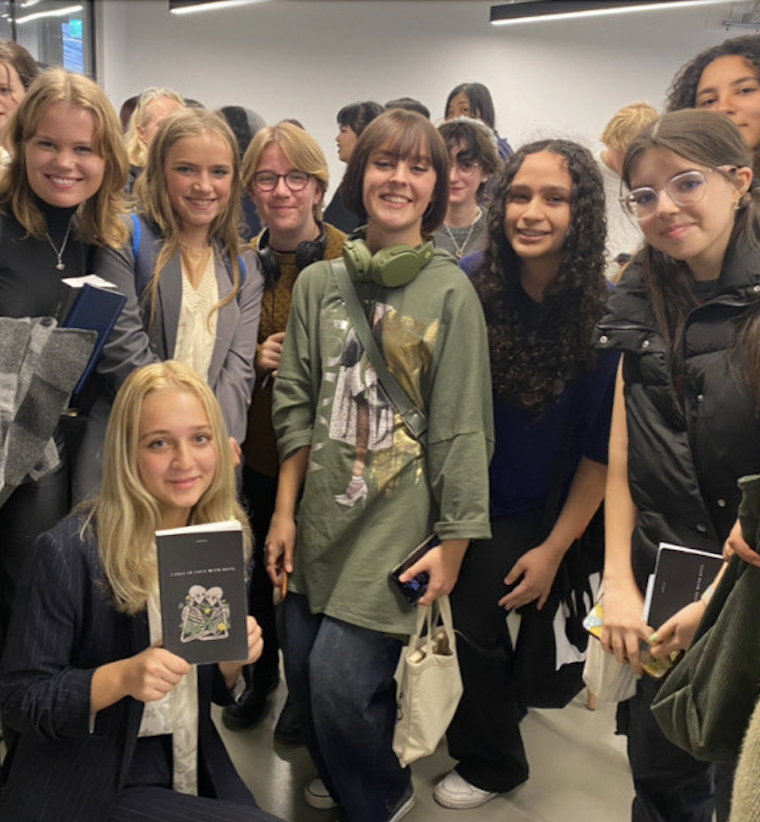How one young author forged a digital path into the publishing world

March 17, 2023 | Story by Elise Plunk | Graphic by Matthew Cupelli | Photos courtesy of Lou-Andrea Callewaert
The bitter scent of espresso hung heavy in the air. Coffee machines hissed and steamed. Customers chatted in line. The warm light in the Archer Road Starbucks in Gainesville, Florida, acted as a lantern against the bleakness of a late winter afternoon.
The bliss of white noise was the perfect backdrop for writing a novel.
Over a year into the throes of editing her second draft, Lou-Andreá Callewaert, also known by the pseudonym Lancali, sought out the modern writer’s refuge at a table with her roommate, Regin George. Neither could get any work done at their house, so it was in Starbucks that Lancali asked Regin to read a draft of her next chapter.
He smiled wide; he had been eager to dive into the next installment of “I Fell In Love With Hope” since he began reading her drafts two weeks earlier. Ever since, he’d been hooked. But as he read Lancali’s newest words, his smile wilted.
“Regin?” Lancali asked, hesitant. “Are you OK?”
Her voice trailed as tears welled in the corners of his eyes. He read on, addicted to each plot twist until he could read no more. He closed the computer and looked at Lancali. He was not OK, despite the small “mhm” he uttered in response to her question. He looked like he could have choked at the end of his sentence if he tried to speak.
Lancali tried her best to look concerned, but she couldn’t mask her surprise. The scene worked. It really worked. The emotion he’d experienced reading her words wasn’t fake, wasn’t artificially created to spare her feelings. Regin didn’t cry. Ever.
“Regin, you’re sobbing in a Starbucks,” she said with a good-hearted laugh. “Do you want to head back to the car?”
He nodded and mustered another “mhm” in response. They’d barely closed the car doors before Regin broke down. Lancali held her friend, a smile spreading across her face as he cried in her arms. Her words did this. Her story, a chance at authorship, at sharing her imagination with the world — it might actually succeed.
This could be something big.
A vow between friends
Lancali, a 21-year-old English literature student at the University of Florida, self-published her first book, “I Fell In Love With Hope,” through Amazon in 2022. The story explores the heartfelt tale of five children — Neo, Sony, Sam, Coer and Hikari — who struggle with illness. Confined to the hospital, the group leans on each other for support, choosing to escape death’s oppressive shadow and embrace a love of living.
Although “I Fell In Love With Hope” is fictional, the story is rooted in Lancali’s lived experiences.
Originally from France, Lancali moved to the United States when she was 10 after her mother decided to pursue post-doctoral studies at Columbia University. She often moved as a child — but no matter the location, she struggled with her health.
“I went through everything that happens in the book,” said Lancali, animated as she talked about her debut novel. She wore a plain white collared shirt with the sleeves rolled to her elbows during my first interview with her, a signature look found in many of her TikToks. Her wild blonde hair was loose, pushed back behind her shoulders. Freckles dotted her cheeks, and her blue eyes were wide as she spoke.
Lancali suffers from an autoimmune disease, where the body mistakes healthy cells for invaders and attacks itself. Diagnosed as a child, the disease profoundly affected Lancali’s life. She spent many years in and out of hospitals, as a chronic illness can come and go in bouts that vary in severity.
Lancali doesn’t share the name or particulars of her disease. But just like the characters in her book, she waged an internal battle against her prognosis — and found a ray of hope in someone experiencing it alongside her.
Lancali met Sam, whose last name is also private, at one of the hospitals where they received treatment for similar autoimmune conditions. As children, the best friends decided they would tell a story in which illness wasn’t a defining feature, but life and love were.
“I promised I would write this book first, because he came up with the initial idea,” Lancali said. “He told me to write it.”
But he never got the chance to read it.
Sam passed away before Lancali could finish the novel. His death crushed her.
“I stopped writing it for a very long time, obviously, because it just was too painful to approach,” Lancali said. But she had made a vow, and she intended to keep it.
After her roommate’s reaction to her draft in Starbucks, she knew her story could leave an emotional mark. Lancali sent her manuscript to publishers, literary agents and anyone who would know how to distribute it to the public. Each one gave the same two-letter response: No.
“I knew no one would give it a chance,” she said.
At first, Lancali was right. Publishers told her scenes depicting childhood trauma, mental illness, eating disorders and death were too mature for the young audiences the book would be marketed to. But Lancali knew how her generation would respond. She even had an audience.
After gaining online recognition for her viral fanfictions inspired by anime and manga like “My Hero Academia,” Lancali took to TikTok to promote her work. She started making videos for fun during the COVID-19 shutdowns in 2020, seeking online escape.
But Lancali soon learned that TikTok could be more than a way to pass the time. It could be a way to find a foothold in the literary world.
The making of a modern author
One of Lancali’s TikToks from 2021 starts with her looking off into the distance, a soft smile on her face while a peppy audio mix plays in the background.
“This is why you don’t give up,” text across the screen says as she opens dozens of cardboard boxes, all filled with copies of “I Fell In Love With Hope.”
“30k copies of a self-published book sold in two months,” the new text reads, her arms full of copies to be signed and delivered.
Despite what publishers had predicted, people were responding to Lancali. She posted often, following popular video trends when talking about her book. Through her anecdotes and honesty, Lancali personally related to her audience through her anecdotes and honesty through the video sharing platform.
“People respond to authenticity,” Lancali said.
And her audience didn’t just respond to it — they seemed to crave it. She was young, just like they were, and made videos, just like they did. Her following grew to almost 800,000 people on TikTok, and views on her videos piled up in the millions. Within a month of its release in August, “I Fell In Love With Hope” sold 25,000 copies — all without initial representation from an agent in the publishing world.
But publishers eventually did take notice. Dozens of emails filled her inbox, offering book deals, audiobook renditions of her novel and the opportunity to give a London TED Talk about her experience as a young female author. Success and criticism came in from all sides, all at once. Managing the momentum was a complicated task.
Stranger still was transitioning from online to in-person interactions. Meeting her followers for the first time at her TED Talk was an odd experience for Lancali, who was used to seeing her audience communicate through comments and follower counts.



During her TED Talk in London, Lancali met dozens of her fans for the first time since gaining TikTok fame. (Photos courtesy of Lou-Andrea Callewaert)
“Social media distorts our social interactions,” Lancali said. “They know you, but you don’t know them, so there’s a bit of a strange dynamic there.”
But despite her start, Lancali may be slowly outgrowing TikTok as a marketing tool. The young author is now represented by Folio Literary Management and working with Simon & Schuster under the imprint Atria on her next book, “Blue’s Shadow.”
“I don’t have to use my TikTok as much anymore,” Lancali said. “Now it’s from word of mouth, meaning people have read [“I Fell in Love with Hope”] since it came out. People are talking about it. And that’s how most books sell themselves.”
Lancali didn’t see any of this coming. Neither did her younger self, who struggled with her writing and her health. But rather than becoming a “pessimist with age,” Lancali has become more optimistic over time.
“I would tell [my 13-year-old self] to just keep doing what she’s doing and that it’s OK to mess up or feel bad about what you’re doing,” she said. “Just keep going.”